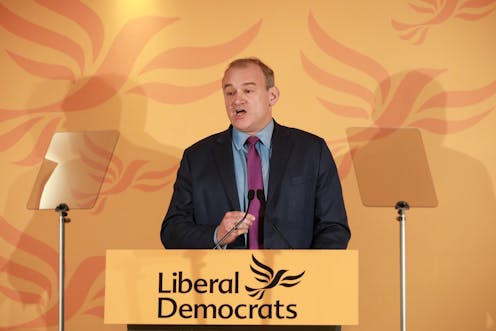
Despite the fact that it is central to so many people’s lives, too often, social care is an afterthought for UK political parties. In the first TV debate of the 2024 general election, Rishi Sunak and Keir Starmer devoted only 36 seconds to this issue.
The Liberal Democrats, by contrast, are bucking that trend. Leader Ed Davey has made a strong personal commitment to care, detailing on camera what his role as a carer for his disabled son entails.
The party has made social care reform one of its key policy commitments. Speaking on Monday June 10 during the 2024 manifesto launch, Davey relayed the impact of caring for his own mother when he was as a child after his father had died and she had contracted Hodgkin lymphoma. “The truth is,” he said, “that unless we properly value care, unless we properly support carers, we will never be able to fix the crisis in our NHS, or get our economy back on track”.
Research has shown that there is a 50:50 chance you will be a carer for an adult by the age of 50. Every day, 12,000 people in the UK take on such a role.
The Lib Dem manifesto addresses many of the key areas that need reform: workforce wellbeing and retention; unpaid carer support; and the cost of care for the people who need it. It raises questions, however, on how the party would pay for these reforms.
Want more election coverage from The Conversation’s academic experts? Over the coming weeks, we’ll bring you informed analysis of developments in the campaign and we’ll fact check the claims being made.
Sign up for our new, weekly election newsletter, delivered every Friday throughout the campaign and beyond.
Free personal care
The most eye-catching commitment in the Lib Dem manifesto is to introduce free personal care. Under this proposal, people would not have to pay for help that they receive with tasks such as washing, dressing and food preparation.
This already happens in Scotland. Research has shown, however, that this strategy comes with some downsides. Making personal care free focuses attention on a narrow and functional set of tasks, rather than focusing on what people actually need to live a good life. It also draws money away from prevention and early intervention.
Mostly, it can mislead people into thinking that care is free, whereas there are still major costs such as the accommodation charges in care homes. What’s more, it doesn’t bring any more money into the system. Indeed, it removes a big chunk of the funding that private individuals currently contribute to social care.
Read more: Why the UK really does need a clear plan to fix adult social care
Workforce retention
The Lib Dems promise to make working in social care a more attractive career. They also want to ensure experienced staff feel more valued, in order to improve retention.
Focusing on workforce issues is critical. Employers have increasingly found it difficult to recruit and retain sufficient numbers of staff, particularly in rural areas. International recruitment has been seen as one way to solve the recruitment shortages, but that comes with a number of issues, not least the exploitation of migrant care workers that has been widely reported.
The Lib Dems are committed to what they’ve termed “ethical international recruitment”. However, research suggests they will struggle to overcome key issues, including the lack of oversight when workers are employed in private care agencies or as live-in carers and the inability of care workers from outside the UK to bring their dependents with them.
Unpaid carers
The Lib Dems also promise to improve the calamitous situation currently facing unpaid carers. The party aims to reform the Carers Allowance, which is much needed. However, there is a risk that the pressure to address recent scandals around the overpayment of this benefit could result in a much more narrow reform than what is actually needed.
Fundamentally, the Carers Allowance is an archaic benefit in need of a comprehensive reappraisal. It was originally introduced in 1976 (then called the Invalid Care Allowance) to provide income replacement to unmarried women providing care.
Over the years the allowance was amended to include first married women and then men. However, the benefit level did not keep pace with incomes and rising living costs. This has resulted in a benefit that confines recipients to impoverished circumstances.
Digital care infrastructure
The party has coupled its aims to boost people’s sense of independence, empowerment and dignity with an emphasis on what they’re calling “tech-enabled lives”. However, research shows that inequalities in terms of digital infrastructure, skills and access to both devices and connectivity are a barrier to people living such tech-enabled lives.
The manifesto does include communications standards, which could address issues of public trust in health and care data. The manifesto references a kitemark for digital health technologies. However, no equivalent system for devices and systems is used in care, where the increasingly crowded and complex marketplace is hard to navigate.
There are questions about whether the party’s tax reforms will be sufficient to pay for the reforms it aims to implement. It is nonetheless heartening to see one of the main political parties giving so much attention to an issue that directly affects so many lives. So too, to hear a commitment to social care from a leader who really seems to mean it.
Kate Hamblin has previously and currently receives funding from funders including: ESRC, DHSC, NIHR, the Health Foundation and Innovate UK. The views expressed are those of the author and not those of the listed funders.
Catherine Needham has previously and currently receives funding from various funders including: ESRC, DHSC and NIHR. The views expressed are those of the author and not necessarily those of the listed funders.
This article was originally published on The Conversation. Read the original article.







